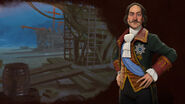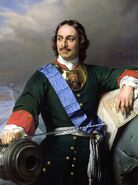- "Remember to feed your people. Soldiers' bellies are not satisfied with empty promises and hopes."
Peter the Great (9 June 1672 – 8 February 1725), also known as Peter I or Peter Alexeyevich, was Tsar of the Russian Empire from 1682 until his death. He leads the Russians in Civilization VI.
Peter's Russia is the spreading amoeba you don’t want next door. He is great at absorbing all the land, technologies, and civics around him!
Intro
Embrace the chill winds of the Motherland, Tsar Peter. Your fascination with science and culture is a gift, and you will learn much from your Grand Embassies to other lands. Under your rule, Russia will surely flourish and spread, absorbing all that lies around it, perhaps creating the greatest land empire seen on this earth.
In-Game
Peter's unique agenda is called "Westernizer." He is friendly to civilizations that are ahead of him in ![]() Science and
Science and ![]() Culture, and dislikes backwards civilizations that are lacking in
Culture, and dislikes backwards civilizations that are lacking in ![]() Science and
Science and ![]() Culture.
Culture.
His leader ability is "The Grand Embassy." Russia can receive ![]() Science or
Science or ![]() Culture from
Culture from ![]() Trade Route Trade Routes to more advanced civilizations.
Trade Route Trade Routes to more advanced civilizations.
Detailed Approach
Peter's bonuses are ideal for taking over large swaths of territory for two reasons. First, Russia's cities innately cover more territory once settled as a result of their unique civ ability. Secondly, Peter's Lavras grant extra tiles for their cities whenever he expends a Great Person. With proper strategy, Russia will quickly amass great swaths of land. Combined with Peter's leader ability to absorb ![]() Science and
Science and ![]() Culture from their respective leading civilizations, and you have a very powerful empire that can win with any type of victory.
Culture from their respective leading civilizations, and you have a very powerful empire that can win with any type of victory.
Lines
Peter is voiced by Mikhail Danilyuk. He speaks Russian.
Voiced
Agenda-based Approval: Your people are worthy of admiration. Arts, sciences... What else can you wish for? (Ваш народ достоин восхищения - искусство, наука... Чего ещё желать? / Vash narod dostoin voskhishcheniya - iskusstvo, nauka... Chego yeshcho zhelat'?)
Agenda-based Disapproval: Your people thirst for knowledge and beauty, but you shun science and art. Why so? (Ваши люди жаждут познания и красоты, но Вы гнушаетесь науки и искусства. Отчего же? / Vashi lyudi zhazhdut poznaniya i krasoty, no Vy gnushayetes' nauki i iskusstva. Otchego zhe?)
Attacked: Your war is futile. It's impossible to defeat Russia! Whoever will come to us with a sword, from a sword will perish! (Ваша война тщетна. Россию победить невозможно! Кто с мечом к нам придёт — тот от меча и погибнет! / Vasha voyna tshchetna. Rossiyu pobedit' nevozmozhno! Kto s mechom k nam pridot — tot ot mecha i pogibnet!)
Declares War: I hereby proclaim you an enemy to Russia, our allies, and God, may he have mercy on your soul. (Засим провозглашаю Вас врагом России, наших союзников, и Господа! Да помилует Он Вашу душу. / Zasim provozglashayu Vas vragom Rossii, nashikh soyuznikov, i Gospoda! Da pomiluyet On Vashu dushu)
Defeated: I am defeated. To live one's life is not like crossing a field. (Я сражён. Жизнь прожить - не поле перейти. / Ya srazhon. Zhizn' prozhit' - ne pole pereyti.)
Greeting: Hello! I am Tsar Peter. A worthy ruler such as yourself must appreciate all the most exquisite things. Do you like art like I do? (Здравствуйте! Я - царь Пётр. Достойный правитель, подобный Вам, должен ценить всё самое изысканное. Любите ли Вы искусство, подобно мне? / Zdravstvuyte! Ya - tsar' Potr. Dostoynyy pravitel', podobnyy Vam, dolzhen tsenit' vso samoye izyskannoye. Lyubite li Vy iskusstvo, podobno mne?)
Unvoiced
Denunciation: I have seen much in my life, but I have never seen such a despicable leader. You should be ashamed, and will be. (Я многое повидал в жизни, но никогда - столь подлого правителя. Вам должно быть и будет совестно. / Ya mnogoe povidal v zhizni, no nihogda - stol' podlogo pracitela. Vam dolzhno byt' i budet sovestno.)
Civilopedia entry
Whether he deserved the sobriquet “the Great” or not, Pyotr Alexeyevich certainly managed some impressive achievements during his four-decade reign over Russia. By his death, Russia had been modernized, westernized, enlightened and revolutionized (at least in terms of culture and science). In a series of successful wars, Peter had gained ports on the Black and Baltic seas and made Russia a “player” in European politics. All-in-all, his legacy still resonates in Russia and Eastern Europe.
Peter avoided the limitations of his elder half-brothers, Feodor III and Ivan V, both physically weak and sickly, and the latter of “infirm mind.” Consequently, when Feodor died childless in May 1682, the Boyar Duma chose the ten-year-old Peter to become tsar, with his mother Natalya Naryshkina to serve as regent. But a revolt of the Streltsy (the Russian palace guard), engineered by the ambitious Sophia Alekseyevna, Ivan’s sister and Peter’s half-sister, forced the boyars to proclaim Ivan and Peter to be “co-rulers” with primacy given to the half-wit. In the turmoil, some of Peter’s family and friends were killed by the Streltsy on Sophia’s orders … and Peter had a long memory.
Sophia was made regent, not that that bothered the young Peter (much) for he was more interested in such pastimes as model shipbuilding, sailing and waging mock wars with his extensive collection of toy soldiers. And his studies. Peter was smart (could say “brilliant”) and his father had installed some of the greatest minds of the Russian Enlightenment – the “learned druzhina” – as his tutors. They indoctrinated him with all those messy concepts popular in Europe at the time: benevolent absolutism, equality (for the non-royal, of course), scientific progress, freedom of speech, the “Republic of Letters,” and a whole host of effete customs.
In the midst of all this learning, his mother sought to distract him with an arranged marriage to Eudoxia Lopukhina in 1689, but that didn’t work out and ten years later Peter forced Eudoxia to become a nun, banished to the convent at Suzdal. Rather more of a distraction was Peter’s plot to seize power from his half-sister. Getting wind of his plans, Sophia moved first. As the Streltsy revolted, Peter fled to an impregnable Orthodox monastery, there to gather his own forces. In the end, Sophia was overthrown and forced to enter a convent (Peter seemed to have some scruples about killing females). The co-rule with the senile and virtually blind Ivan continued, but now with Peter having the real power.
Drawing on all that enlightened thinking he’d absorbed, Peter almost immediately implemented sweeping reforms aimed at modernizing Russia in the European manner. He faced a bit of opposition – uprisings by the Streltsy, boyars, Bashkirs and Bulavin Cossacks – but his response was invariably swift and brutal. He implemented his “social modernization” with equal single-mindedness; as an outward sign of the progress Russia was making in becoming civilized (ever an uphill struggle), Peter required his courtiers, officials and officers to shave their beards and adopt modern dress. In fact, he placed a tax on beards and robes in September 1698.
But to keep all this progress rolling, Russia needed an easier way to connect with Europe: maritime ports that would open Peter’s realm to the ready exchange of goods and knowledge with the West. To the north, the Baltic was dominated by stiff-necked Swedes; to the south the Ottomans held the Black Sea and the Persian Safavids the Caspian. To even contemplate war with such powerful neighbors, Peter needed allies and supporters among the European monarchs. He set out on his “Grand Embassy” in 1697 to gain them.
While he didn’t succeed in his plans – forcing Russia to go it alone with the heavyweights – Peter did get to see Europe firsthand, from Amsterdam to London to Leipzig to Vienna, and was enamored. He studied shipbuilding with the Dutch East India Company, and hired shipwrights and seamen to go to Russia. He paid a visit to the famed Frederik Ruysch, who taught him how to draw teeth and collect butterflies. In England, he met with the king and learned about “modern” city planning in Manchester. Unfortunately, a revolt by the Streltsy caused Peter to cut his European vacation short. Arriving home, Peter had some 1200 of them tortured and executed, and finally disbanded the irritating Streltsy and created a new Imperial Guard.
Even without allies, Peter got Russia embroiled in war with the Turks. But the outbreak of the Great Northern War forced him to come to a temporary accord with them, although he did manage to hang onto captured Azov, a strategic fortress where the Don River empties into the Black Sea. While the Poles and Lithuanians kept the Swedish king and military genius Charles XII busy by dying a lot, Peter took Ingermanland on the Baltic from the Swedes in 1703 and founded the city of St. Petersburg, destined to be the new Russian capital. By the time Charles got done smashing the Poles, Peter was ready for the Swedish invasion. Skillfully retreating southward, getting defeated periodically, the Russians finally won their great victory at Poltava, effectively ending the war. In the end, in 1721, Peter acquired some nice new additions to his empire: Livonia, Estonia, Ingria and a substantial portion of Karelia.
Peter the Great spent the end of his days reforming again. He took a hand in reorganizing the Russian Orthodox Church; when the traditional head of the church, the Patriarch of Moscow died, the tsar refused to name a replacement as usual and instead created a Holy Synod to govern it. And he created an act that forbade any man to enter a monastery before the age of 50, believing that their productive years were being wasted. He issued a decree establishing compulsory education, abolished the land and household taxes (although, no fiscal fool, he did institute a poll tax), and began the Peterhof Palace for his descendants to enjoy. He never got to see it himself, dying in February 1725 at the age of 52.



